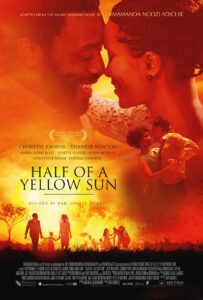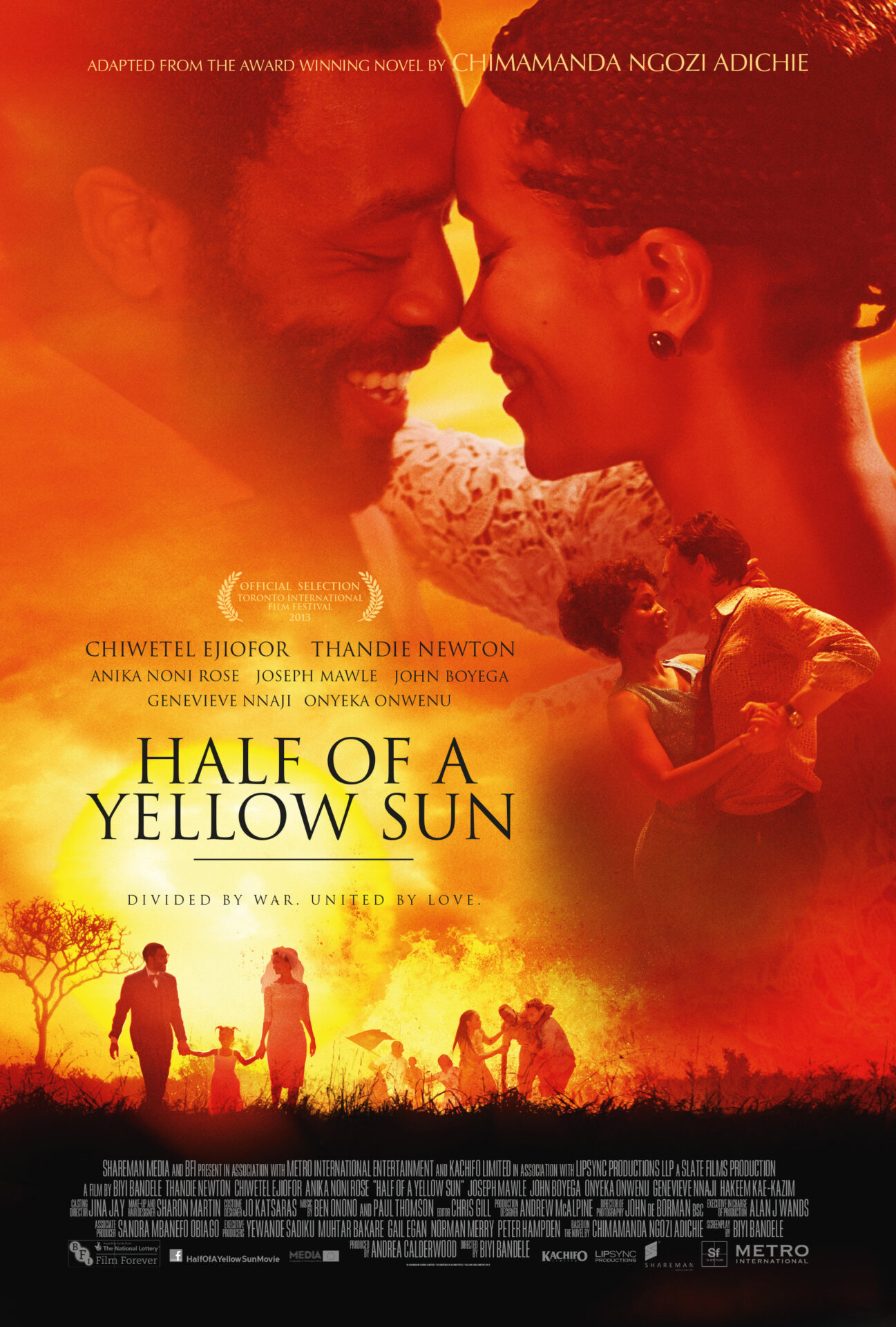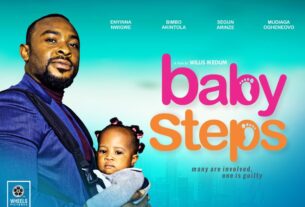
“Half of a Yellow Sun” is a powerful Nigerian drama film directed by Biyi Bandele, based on the critically acclaimed 2006 novel by Chimamanda Ngozi Adichie. Set against the backdrop of the Nigerian Civil War, also known as the Biafran War (1967-1970), the film explores the profound emotional and societal upheaval brought about by the conflict, as seen through the lives of three central characters—Olanna, Odenigbo, and Ugwu—and their intertwined destinies.
The story is predominantly told from the perspective of Olanna (Thandie Newton), a well-educated, wealthy woman from a prominent Nigerian family. Olanna moves to the southeastern region of Nigeria to be with Odenigbo (Chiwetel Ejiofor), a passionate university professor and intellectual who becomes heavily involved in the Biafran independence movement. The two share a tumultuous relationship as they navigate the physical and emotional turmoil of the war. Olanna’s idealism about love and politics clashes with the reality of Odenigbo’s sometimes volatile personality and his increasingly radical views. This tension marks a significant part of Olanna’s emotional journey, as she struggles to reconcile her personal life with the mounting pressure of war.
Olanna’s twin sister, Kainene (Anika Noni Rose), provides a sharp contrast to her. While Olanna is idealistic and politically engaged, Kainene is pragmatic, ambitious, and fiercely independent. She works for the Biafran government, managing logistics for the war effort while trying to maintain her business amidst the chaos. Kainene’s cold and measured approach to life serves as a foil to Olanna’s emotional and often tumultuous existence, especially as the war intensifies. Kainene’s fate remains ambiguous, adding a layer of uncertainty to her character’s arc, which contrasts with the more direct emotional resolutions of Olanna and Ugwu’s journeys.
At the heart of the film is Ugwu (John Boyega), a young boy from a rural village who becomes a houseboy for Odenigbo. Ugwu represents the ordinary Nigerian caught in the throes of the war. Initially naive and innocent, Ugwu’s character undergoes a profound transformation as he witnesses the brutalities of war firsthand. His journey is one of loss, growth, and disillusionment. From his initial awe of Odenigbo’s intellectualism to becoming embroiled in the horrors of war, Ugwu’s character evolution offers one of the film’s most poignant storylines. His experience on the frontlines as a soldier starkly contrasts with his youthful innocence at the film’s beginning, encapsulating the tragedy of war’s impact on a generation.
As the war intensifies, the relationships between the characters face insurmountable challenges. Olanna and Odenigbo’s relationship starts to unravel under the immense strain of the war, with Odenigbo’s ideological convictions and his sometimes erratic behavior creating a divide between them. Meanwhile, Ugwu’s transformation from a naive boy to a hardened soldier represents the emotional cost of war for the younger generation, as he grapples with his role in the conflict, his growing disillusionment, and the emotional scars the war leaves on him.
The film’s narrative structure is complex, shifting between the past and present, allowing for a deeper exploration of trauma, memory, and the lasting effects of war on individuals and families. Flashbacks highlight the events leading up to the war and provide insights into the personal and political motivations that shaped the characters’ actions. Through these flashbacks, the film explores the emotional costs of war and the way it alters people’s identities and relationships.
In addition to the central narrative, the film also portrays the broader historical and political context of the Nigerian Civil War. The Biafran War, fought between the government of Nigeria and the secessionist state of Biafra, is a tragic and little-discussed chapter in Nigerian history. The film sheds light on the complexities of the conflict, including ethnic divisions, political ideologies, and the devastating toll it took on Nigeria’s population. The harrowing conditions faced by the Biafran soldiers and civilians, including widespread starvation, are depicted with unflinching honesty.
The film’s performances are standout, particularly Thandie Newton’s portrayal of Olanna, whose emotional depth brings the character’s inner turmoil to life. Chiwetel Ejiofor delivers a strong performance as Odenigbo, capturing the character’s intellectual fervor, emotional complexity, and inner conflict. John Boyega’s portrayal of Ugwu is especially poignant, as he transforms from an innocent rural boy into a young man hardened by the atrocities of war. His performance conveys the deep emotional scars that war inflicts on the psyche of young soldiers, making Ugwu’s character arc one of the film’s most compelling.
The film’s cinematography and production design also deserve mention, as they effectively recreate the tension and destruction of the Nigerian Civil War. The film’s attention to detail in depicting the 1960s and 1970s setting, from the costumes to the production design, transports the viewer into the world of the characters. The film also uses visual motifs, such as the titular half of a yellow sun, to symbolize the divided state of Nigeria and the conflicting ideologies at play.
At its heart, Half of a Yellow Sun is a story of love, loyalty, betrayal, and the destruction of hope, set against the backdrop of a nation torn apart by civil war. The film humanizes the larger historical and political forces at play, focusing on the emotional and psychological impact of the war on individuals. The characters’ personal struggles and choices provide the emotional core of the narrative, making the film not just a political commentary, but a deeply personal and moving exploration of the human condition in the face of devastating conflict.
Despite the historical and political significance, the film remains centered on its characters’ experiences, making it accessible to audiences unfamiliar with the specifics of Nigerian history. Its portrayal of love, loss, and survival resonates universally, allowing viewers to relate to the characters’ struggles even if they are not familiar with the history of the Biafran War.
In conclusion, Half of a Yellow Sun is an ambitious adaptation of Chimamanda Ngozi Adichie’s powerful novel. With strong performances, an engaging narrative, and a deep emotional resonance, the film serves as both a historical record of the Nigerian Civil War and a poignant exploration of the personal toll of war. It is a testament to the resilience of the human spirit in the face of adversity and a reminder of the enduring cost of conflict.




